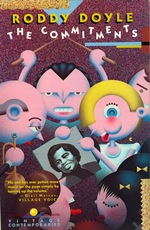
The Top 5 Saturday weekly meme was created by Amanda at Devouring Books.
Rules!
- Share your top 5 books of the current topic—these can be books that you want to read, have read and loved, have read and hated, you can do it any way you want.
- Tag the original post (This one!)
- Tag 5 people (I probably won’t do this bit, play along if you want)
This week’s topic is: Trilogies. I immediately wrote down three of these, and then thought a bit and came up with 8 more. I whittled those down to five—the ones that had the biggest impact on me/my development as a reader. I left a lot of good candidates out, but at the end of the day, these are the biggies for me. I’ve read them all multiple times (except #4, honestly—only read that twice), and would gladly do so again tomorrow (well, okay, in three weeks, am too busy in the meantime).
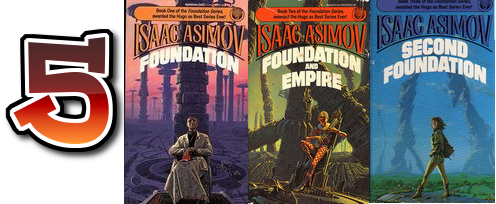
The Foundation Trilogy
by
Isaac Asimov
Hari Seldon, uber-mathematician, creates a new science combining mathematics and social sciences to predict (and shape) how humanity will react to the imminent fall of the Galactic Empire. He uses this science to come up with a way to shape the future, helping humanity survive the challenges on their way. I read this sooo many times in high school—for years it served as the ruler by which I judged all SF. Also, other than his Black Widowers mysteries, my favorite works by Asimov.
Yeah, there were a couple of sequels (not nearly as good) and other related works, but these were a trilogy for so many years, I have no problem ignoring the others.
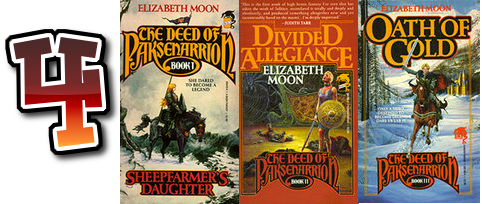
The Deed of Paksenarrion
by
Elizabeth Moon
Wow. This is just…wow. Rather than submit to the arranged marriage her father has planned, Paksenarrion, takes off and joins the army. Eventually is trained and recognized as a Paladin. A fantastic hero’s journey that I wish I remembered more of. I remember being blown away by it and hating that the trilogy ended.
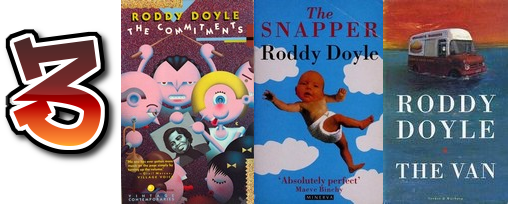
The Barrytown Trilogy
by
Roddy Doyle
Can I talk about these in less than 1500 words? These books focus on the Rabbitte family in Dublin. The first chronicles the oldest son’s attempts to launch his career as the manager of The Commitments, the second is about the very unplanned pregnancy of the eldest daughter (and her father’s struggle to accept it—followed by his outrageous pride for the kid), and the last focuses on the father’s attempt to provide for his family after he becomes unemployed by opening a chip van (a precursor to today’s food truck obsession). They’re all as funny as you could hope, full of hope, sadness, and love. I’m getting excited just by writing this snipped about them.
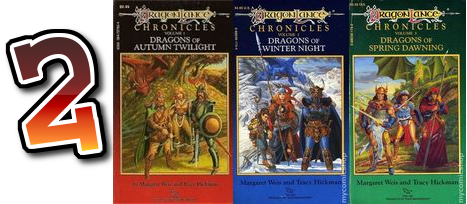
The Dragonlance Chronicles
by
Margaret Weis and Tracy Hickman
Dragons of Autumn Twilight, Dragons of Winter Night, and Dragons of Spring Dawning were my obsession in eighth grade—one I shared with as many people as I could. I’m pretty sure the fantasy I respond to today is the fruit of these books. And I’m totally okay with that. Say what you will about the quality of these, they hold a special place in my heart (right above the cockles, near the blockage on the right)

The Hitchhiker’s Guide to the Galaxy Trilogy
by
Douglas Adams
Was there any doubt? I can’t stop talking about Adams/This Trilogy (see my Annual Towel Day posts, for example). From the moment I read the first chapter (three or four times before I moved on to Chapter 2) to the point when I heard the radio series to getting the planet icon tattooed on my arm to today and all points between. This Trilogy has been at or near the top of my list, and will stay there for a long time to come.
I maybe should’ve added Colfer’s 6th volume, but…I decided to go old school.
![]()



 Jimmy Rabbitte, Sr. started off as a supporting character in The Commitments, moved up to co-star in The Snapper, and finally moves to the forefront in The Van, which is more about him than the other two were about any one person. Which isn’t to say that Jimmy, Jr., Sharon, Veronica, Darren and the twins aren’t here, they’re just in the background — as are most of Jimmy, Sr.’s friends (actually, I think Jr.’s in this far more than he was The Snapper).
Jimmy Rabbitte, Sr. started off as a supporting character in The Commitments, moved up to co-star in The Snapper, and finally moves to the forefront in The Van, which is more about him than the other two were about any one person. Which isn’t to say that Jimmy, Jr., Sharon, Veronica, Darren and the twins aren’t here, they’re just in the background — as are most of Jimmy, Sr.’s friends (actually, I think Jr.’s in this far more than he was The Snapper). 


